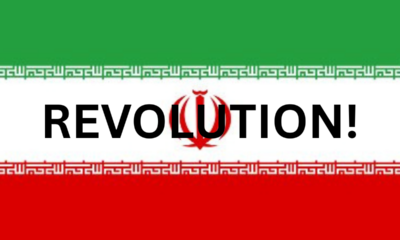Guest Columns
The Operational Atheism of Islam: An Unconventional Assessment

Let’s begin with the definition of atheism as the absence of belief that any deities exist. Atheism is therefore contrasted with theism, a more complex and controversial concept.
Theism…
Starting on the surface, theism is commonly regarded as a monotheistic doctrine concerning the deity’s relationship to the universe. Theism conceives of God as personal, present, and active in the governance and organization of the world and the universe. As such, theism describes the classical conception of God that is found in Judaism and Christianity and which, as we shall see, is erroneously attributed to Islam.
Here it should be noted that during the scientific revolution of the seventeenth century, the term theism was used to distinguish it from the then-emerging concept of deism. Deism contended that God, though transcendent and supreme, does not intervene in the natural world and could be known rationally but not via revelation.
…and operational atheism
Although Islam, for obvious reasons, cannot deny revelation without denying its founder, Muhammad, it nonetheless takes the deistic position that God does not intervene in human affairs. In other words, God is transcendent but not imminent. However, insofar as Islam denies God’s imminence and thereby any Divine relationship to human affairs, it follows that Islam, like Deism, harbors “operational atheism.”
Moreover, and as is well known, Islamic theology posits a doctrine of absolute determinism. Absolute determinism may also be attributed to Deists who accept the mechanistic determinism of Newtonian physics. Here is how theoretical physicist Paul Davies defines this determinism:
In the old Newtonian theory, every atom moves along a trajectory that is uniquely determined by the forces which act on it… Newtonian mechanics permits, in principle, the accurate prediction of everything that will ever happen on the basis of what can be known at one instant. There is a rigid network of cause and effect, and every phenomenon, from the tiniest jiggle of a molecule to the explosion of a galaxy, is determined long in advance. [See Paul Davies, God & the New Physics (New York: Simon & Schuster: 1983), 136.)]
Determinism, as manifested in Islamic theology, obviously denies free will. And since the paramount attribute of Islam’s deity is absolute power, it leads to absolute predestination. This reduces Islam’s God, like Aristotle’s Prime Mover, to a philosophical concept which anyone – fool, genius, or terrorist – may use or discard at his own pleasure.
When everything is permissible…
Here it may be of interest to juxtapose Dostoevsky’s The Brothers Karamazov, where Ivan Karamazov says, “If God does not exist, everything is permitted.” Islam bestows this permissiveness on “believers” vis-à-vis all non-believers (to say nothing of “incorrect” believers). The holy Quran exalts the Muslim who “slays and is slain” for Allah (Sura 9:111). This doctrine has been the driving force of Islamic history. Indeed, according to the Center for the Study of Political Islam reported in Front Page Magazine on February 21, 2007, Muslims have slaughtered approximately 270 million people since the ascendancy of Muhammad!
Viewed in this light, may we not conclude that Islam, shorn of its pseudo-religious veneer, is “operational atheism” comparable to Nazism?!!
-

 Accountability2 days ago
Accountability2 days agoWaste of the Day: Principal Bought Lobster with School Funds
-

 Constitution2 days ago
Constitution2 days agoTrump, Canada, and the Constitutional Problem Beneath the Bridge
-

 Executive18 hours ago
Executive18 hours agoHow Relaxed COVID-Era Rules Fueled Minnesota’s Biggest Scam
-

 Civilization17 hours ago
Civilization17 hours agoThe End of Purple States and Competitive Districts
-

 Civilization4 days ago
Civilization4 days agoThe devil is in the details
-

 Executive4 days ago
Executive4 days agoTwo New Books Bash Covid Failures
-

 Civilization3 days ago
Civilization3 days agoThe Conundrum of President Donald J. Trump
-

 Executive4 days ago
Executive4 days agoThe Israeli Lesson Democrats Ignore at Their Peril











